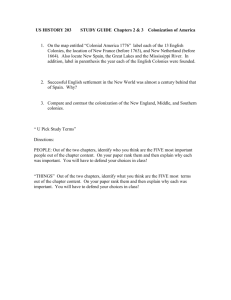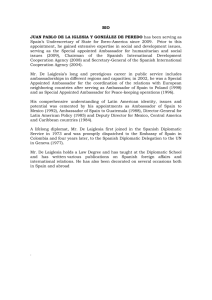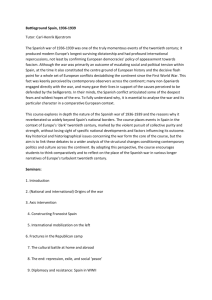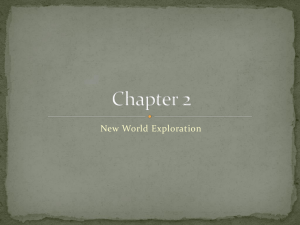the diplomatic actions of capodistrias regarding the liberation of the
advertisement
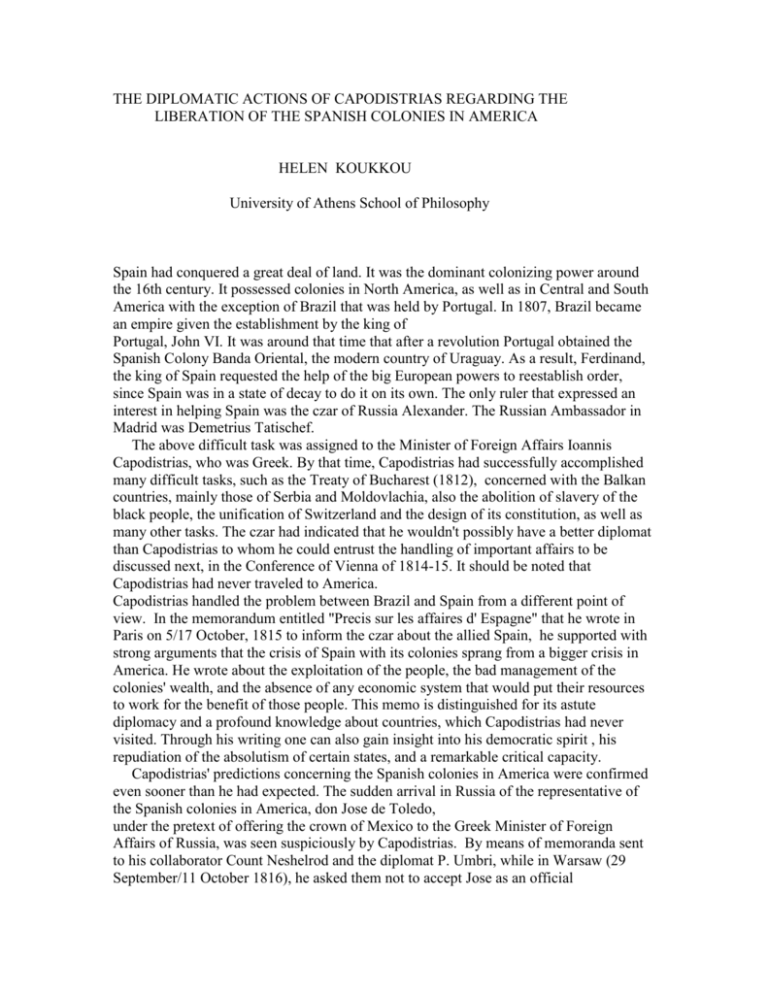
THE DIPLOMATIC ACTIONS OF CAPODISTRIAS REGARDING THE LIBERATION OF THE SPANISH COLONIES IN AMERICA HELEN KOUKKOU University of Athens School of Philosophy Spain had conquered a great deal of land. It was the dominant colonizing power around the 16th century. It possessed colonies in North America, as well as in Central and South America with the exception of Brazil that was held by Portugal. In 1807, Brazil became an empire given the establishment by the king of Portugal, John VI. It was around that time that after a revolution Portugal obtained the Spanish Colony Banda Oriental, the modern country of Uraguay. As a result, Ferdinand, the king of Spain requested the help of the big European powers to reestablish order, since Spain was in a state of decay to do it on its own. The only ruler that expressed an interest in helping Spain was the czar of Russia Alexander. The Russian Ambassador in Madrid was Demetrius Tatischef. The above difficult task was assigned to the Minister of Foreign Affairs Ioannis Capodistrias, who was Greek. By that time, Capodistrias had successfully accomplished many difficult tasks, such as the Treaty of Bucharest (1812), concerned with the Balkan countries, mainly those of Serbia and Moldovlachia, also the abolition of slavery of the black people, the unification of Switzerland and the design of its constitution, as well as many other tasks. The czar had indicated that he wouldn't possibly have a better diplomat than Capodistrias to whom he could entrust the handling of important affairs to be discussed next, in the Conference of Vienna of 1814-15. It should be noted that Capodistrias had never traveled to America. Capodistrias handled the problem between Brazil and Spain from a different point of view. In the memorandum entitled "Precis sur les affaires d' Espagne" that he wrote in Paris on 5/17 October, 1815 to inform the czar about the allied Spain, he supported with strong arguments that the crisis of Spain with its colonies sprang from a bigger crisis in America. He wrote about the exploitation of the people, the bad management of the colonies' wealth, and the absence of any economic system that would put their resources to work for the benefit of those people. This memo is distinguished for its astute diplomacy and a profound knowledge about countries, which Capodistrias had never visited. Through his writing one can also gain insight into his democratic spirit , his repudiation of the absolutism of certain states, and a remarkable critical capacity. Capodistrias' predictions concerning the Spanish colonies in America were confirmed even sooner than he had expected. The sudden arrival in Russia of the representative of the Spanish colonies in America, don Jose de Toledo, under the pretext of offering the crown of Mexico to the Greek Minister of Foreign Affairs of Russia, was seen suspiciously by Capodistrias. By means of memoranda sent to his collaborator Count Neshelrod and the diplomat P. Umbri, while in Warsaw (29 September/11 October 1816), he asked them not to accept Jose as an official representative of the colonies, or let him stay in Russia for a long time. They were asked to find out in a diplomatic way the purpose of his "mysterious" visit, given that Jose had arrived without the proper diplomatic dispatch. Even more, Capodistrias asked his colleagues to seek information about the general internal affairs in the colonies and their relations with the Spanish Government, as well as about the extent to which the latter would provide its colonies with political independence. At the same time, he insisted that they should gather information about the general moral and financial conditions of people, and above all, ask about the revolutionary government that had seized power. On 10/22 November 1817, Capodistrias sent a confidential letter to the Ambassador of Spain in St. Petroupolis, Zea Bermoutheth, referring to the conflict between Spain and Brazil caused by the coup in the provinces of Rio de la Plata and the king's of Spain request for external mediation to help resolve the situation. Capodistrias suggested to the Spanish Ambassador that his country should accept the Convention signed in the Conference of Vienna in 1814-15 by the rest of the powers. The issue of the Spanish colonies in America was the topic of many discussions czar Alexander held with his Minister Capodistrias, as the latter indicates in his well-informed memorandum to czar Nicolaus in 1826. Those discussions were initiated at Ferdinand' s request to czar Alexander for diplomatic mediation. The good intentions of Russia were disrupted by the interventions of the English government, which with the support of Austria " managed to cancel everything". The provinces of Rio de la Plata remained in Brazil and caused further problems. The revolutionary acts, however, went on in the Spanish colonies of South America. After 1816, one colony after the other managed to achieve their independence. The province of La Plata was declared a free republic under the name Argentina. Capodistrias followed developments very closely by having also his representative in London pay attention to whatever was mentioned in the English newspapers and those circulated in the United States of America, the Spanish and Portuguese colonies of the western hemisphere as well as in their metropolis. On 30 March 1818, he sends another confidential letter to the Spanish Ambassador in St. Petroupolis providing him with detailed guidelines, regarding diplomatic activities, the Spanish government should follow in order to confront the revolutions of its colonies. He suggested that Spain should settle the issue with Rio de la Plata in a friendly and not warlike manner, for that seemed to be the best way under the circumstances. In September of 1818, during the Conference in Aachen (Aix la Chappelle), Capodistrias brought the issue of the mediation of the European powers in the war of Spain with its colonies, but England refused to do so. As a result, no decision was made about this important issue.. The paradox was that this failure was partly due to Spain's double-faced diplomacy. Capodistrias wrote an ingenious memorandum to the czar, on 6 July 1818, providing a detailed account of all what took place in Aachen, including the diplomatic intrigues of England and Austria. In his memorandum, Capodistrias officially disputed the idea that "might is right," as was promoted by the big powers- England, Russia, Austria, Prussia- and exercised on the rest of the countries after the Treaties of Vienna and Paris ( 1815). He took the position that unless there was a complete alliance with the full participation of all the European States- small and big ones alike- peace would not be settled worldwide. Contrary to this position, the existing alliance served only its own territorial interests at the expense of the weaker countries. In another memorandum sent to the czar (1/11/1818) under the title "Pacification des Colonies Espagnoles", Capodistrias presented a detailed account of the discussions and deliberations that took place during the above Conference. The main issue of two of its meetings was the "restoration of stability in the Spanish colonies of America". Following the presentation of documents by Spain to the rest of the powers, it became clear that Spain did not have any substantial proposals concerning this serious issue, while England supported that the discussion should take place without the presence of the Spanish representatives. But, Capodistrias supported the participation of the Spanish representatives. Nevertheless, despite the long discussions and exchange of views between Spain and its allies, the issue remained rather irresolvable. Capodistrias supported the view that a "preliminary proposal" should be negotiated between Spain and its revolted colonies, that would provide fundamental constitutional rights to them. This would be further secured by an "Act of Pacification". Those proposals were in accordance with legal principles and the notion of fairness, and were accepted by the revolted party, who had been under a suffocating power forced on them by the Spanish governors. To those important proposals the English Minister Castlreagh did not object, yet instead, he requested a postponement of the resolution. Much to the dismay of Capodistrias, the rest of the powers agreed with that idea. Before the end of the Conference, the English representatives proposed to the king of Spain, Ferdinand VII, to accept Duke Wellington as the referee between Spain and the revolted colonies. On Capodistrias' insistence, the discussion of the English proposal was postponed as well. As a middle solution, it was finally decided to send an official memorandum to Tatischef (13/25 December 1818) on behalf of the Russian government, which was written by Capodistrias and according to which Duke Wellington would be sent as a mediator, in response to the need for European intervention. They did, however, allow the king of Spain to have the last say as to whether he would accept the above proposal or not. In that memorandum, Capodistrias explained to his Ambassador in Madrid the entire problem and the czar's wishes for a good settlement. After six days, on 31 December 1818, Capodistrias sent another, long and detailed, memorandum to the czar on the above Conference of Aachen, in which he emphasized the diplomatic intrigues of England, that endangered the settlement of the dispute between Spain and its colonies. Between 1819 - 1820, Spain, under the tyrannical reign of Ferdinand VII, faced serious problems. In another memorandum (24 August 1819) sent from London, Capodistrias indicated that England was pressuring Spain to confirm the agreement and settle the issue of Rio de la Plata or else the English government in its attempt to secure the system of neutrality existing between it and their American colonies and to protect its trade interests would have to organize a marine expedition against Spain, as Castlereagh declared to Capodistrias. Capodistrias was against the English intervention, since it would perplex the European problems and would not persuade Portugal and Spain to settle amicably their disputes over their colonies. In an important memorandum, addressed to the czar on 11 April 1820, he went through this hot issue and supported earnestly the view that the revolts in both Europe and America originated from the inadequacy, the lack of ability and honesty, as well as the bad governance of the European governments, which led to the suffocation of the weaker social classes and to their violent reaction. In another memorandum to the Russian Ambassador in Naples (Italy) on 2 September 1820, he regarded as significant the organization of a new European Conference in order to deal with the tragic situation. The Conference did take place in Troppau at the end of October of 1820. Before this new Conference took place, Capodistrias sent a long letter to Metternich, in which he judged critically the policies of Metternich' s government on crucial European and American issues. He insisted that the European leaders should jointly settle all the disputes and ensure that the politically oppressed are handled with a spirit of fairness and in accordance with shared ethical values. Until the last moment that Capodistrias held the position of Minister of Foreign Affairs of Russia (June 1822), he kept on fighting for the settlement of the disputes between Spain and its colonies. Eventually, their uprisings granted to them independence. Once again, the historical sequel proved how well justified Capodistrias' diplomatic activities had been.
